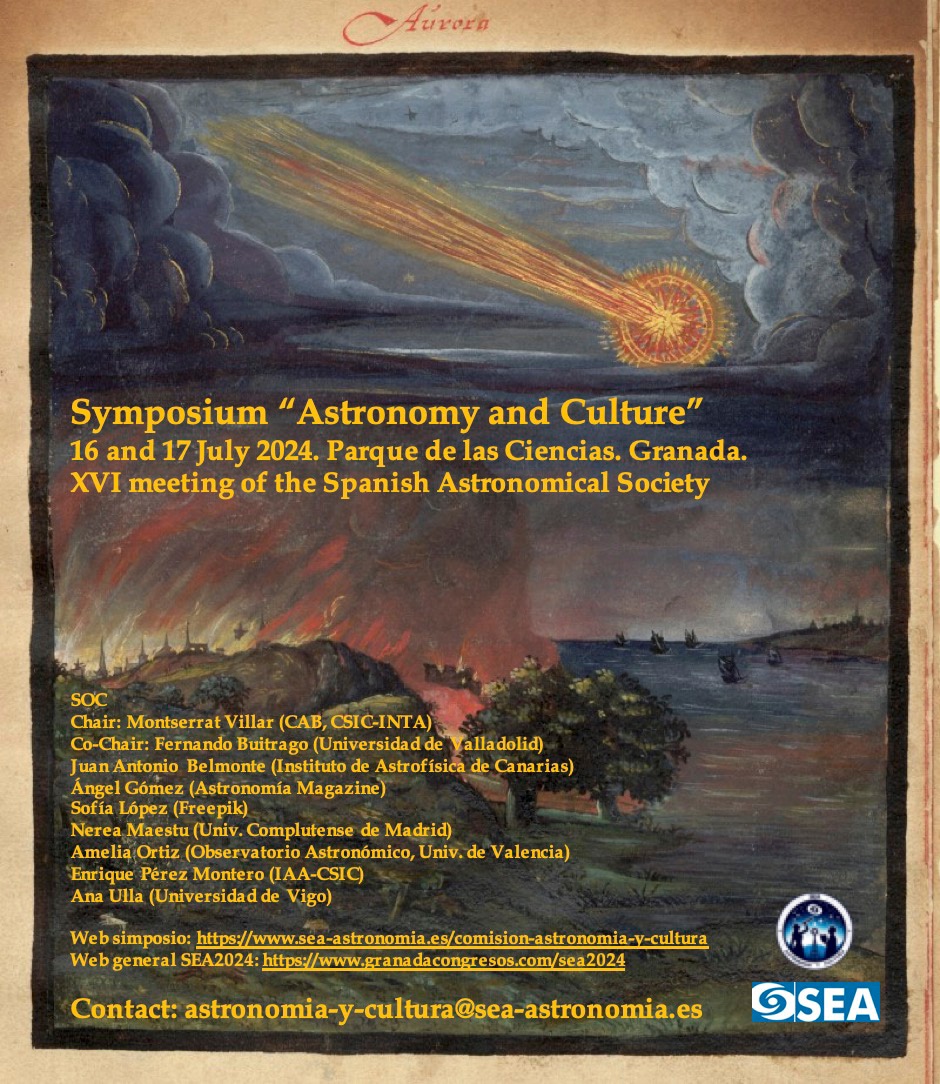ESPAÑOL
[English version below]
Objetivos y alcance
La observación del cosmos y el registro de fenómenos astronómicos han permeado culturas de todo el mundo durante milenios. El principal objetivo de este simposio es estimular, por primera vez en un congreso de la SEA, una reflexión y discusión en profundidad sobre la influencia de la Astronomía en todas las artes y conocimientos de todas las sociedades humanas, desde la prehistoria hasta la actualidad, y teniendo en cuenta su contexto cultural. Este objetivo se abordará desde múltiples perspectivas abordando una diversidad de temas enmarcados en áreas como la Historia de la Astronomía, Arqueoastronomía o Arte y Visualización (plástica, escrita y en cualquiera de sus maneras) de la Ciencia. En otras palabras, queremos poner el foco en la Astronomía dentro de las Humanidades, o en el carácter humanista inherente a la Astronomía.
Esta será la primera de una serie de iniciativas impulsadas por la recién creada comisión SEA “Astronomía en la Cultura”. Entre nuestros objetivos se encuentran aumentar la representación en SEA y facilitar el intercambio de conocimientos de investigadores y comunicadores científicos del Arte, las Humanidades y otras ramas de las Ciencias, que estén interesados en el papel que ha jugado la observación, visualización e interpretación del cosmos en las sociedades de diferentes épocas y lugares. Este simposio sería una excelente oportunidad a este respecto.
Programa
El simposio consistirá en una serie de charlas centradas principalmente en proyectos de investigación relacionados con “Astronomía y Cultura” en la línea descrita más arriba. También se considerarán para presentaciones orales proyectos de divulgación de alto impacto alineados con el objetivo principal del simposio. No se considerará la presentación de posters.
El programa se articulará en tres partes de entre 1.5 y 2 horas de duración, distribuidas entre el martes 16 y el miércoles 17 de julio.
Charlas invitadas
“¿Astronomía megalítica? Dónde estamos y hacia dónde vamos” (título preliminar). César González García (Incipit, CSIC). Científico titular del CSIC. Vicepresidente senior de la Sociedad Europea para la Astronomía en la Cultura.
“El papel de las exploraciones ibéricas en el inicio de la Revolución Científica”. David Barrado (CAB, CSIC-INTA). Profesor de Investigación (INTA). Premio de la Unión Astronómica Internacional 2021 a la mejor tesis doctoral en la división “Education, Outreach and Heritage”.
"Cometas en el cielo de la Baja Edad Media". Nerea Maestu (Investigadora predoctoral FPU en el Departamento de Historia del Arte de la Universidad Complutense de Madrid).
Solicitud de contribuciones
Información sobre el proceso de inscripción, solicitudesd de becas de alojamiento para miembros junior y envío de solicitud de comunicaciones en esta página.
Fechas importantes (información general para la SEA2024)
SOC
Co-Chair: Fernando Buitrago (Universidad de Valladolid)
Juan Antonio Belmonte (Instituto de Astrofísica de Canarias)
Ángel Gómez (Astronomía Magazine)
Sofía López (Freepik; Málaga)
Nerea Maestu (Univ. Complutense de Madrid)
Amelia Ortiz (Observatorio Astronómico, Univ. de Valencia)
Enrique Pérez Montero (IAA-CSIC)
Ana Ulla (Universidad de Vigo)
Contacto: astronomia-y-cultura@sea-astronomia.es
Web SEA2024: https://www.granadacongresos.com/sea2024

